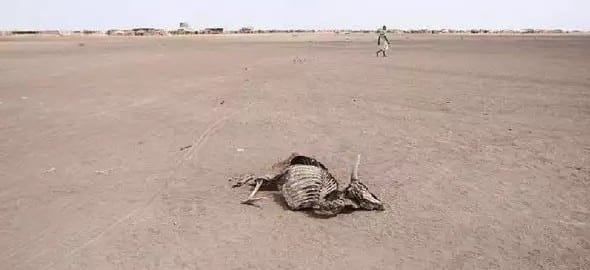Last updated on September 11th, 2021 at 03:03 pm
Over 1,000 animals died on a farm north of Cape Town, South Africa in recent months. This is as a result of the severe drought affecting the Kahalari Desert.
The situation is more serious as the local flora and fauna, which are used to protect climatic conditions, struggle to survive.
Inhabitants are displeased about this as they live off the income of safari hunters.
“We’re trying to get used to it for the moment, but it should only last until our resources are exhausted. And we don’t have the money to continue doing what we’re doing”, Thuru Lodge manager, Burger Schoeman said.
The situation has forced the company to put reservations by tourists on hold.
“Unfortunately the drought forced us to place all our bookings on hold. We can’t book a guy coming from overseas having the safari feeling and trying to give him the best safari he ever had but the animals that are here are very skinny and is dying”, Schoeman added.
The owners of the farm spend about $14,000 a month just to feed the cattle and try to keep them alive. This task was given to Paul, one of the few remaining employees. He’s worked on the farm for 28 years and managed to make ends meet with tips from customers. But this year, he had a hard time sending his children to school.
“I needed to borrow money this year just to buy them books and stuff. The years before I had the money. Things are tight, much worse than before”, Thuru Lodge tracker, Paul Ludick said.
A few miles away, Johan Steekamp, a farm equipment dealer, admits that within a year the situation has gotten much worse.
“Our animals are really suffering – we have lost a lot of them. At this stage, I only have 30 to 40% of my herd left. Everything else is either dead or we’ve had them slaughtered”, Steekamp said.
The rainy season is expected in the region in the next few days. This is very much anticipated. The farms and their animals will need more than a year to recover.

